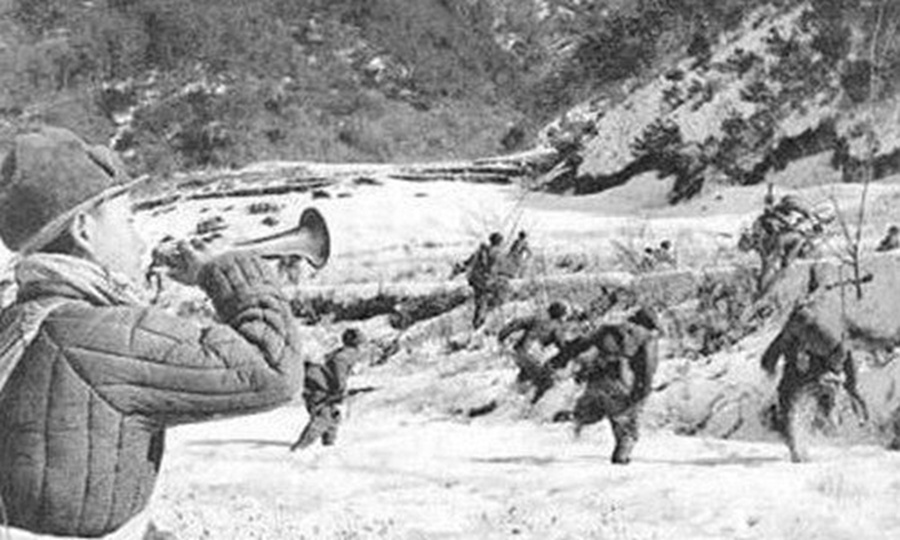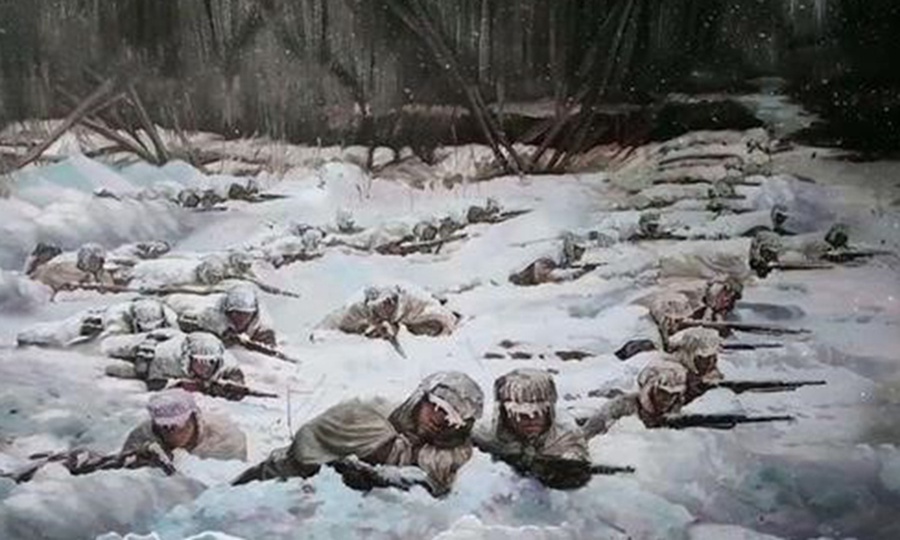




- BRNN
- BRI News
- BRNN News
- Database
Official Documents Polices and Regulations
Inter-government Documents International Cooperation BRI Countries
Business Guide Economic Data BRI Data
Trade
Investment Projects Latest projects
Cases - Content Pool
It was 2001. Li Ganglin, a military literature writer, sat down with a US ex-serviceman at a restaurant in Alberta, Canada. The two had never met before, but it was a moment of intense emotions for both.
Li was brought to tears as his interlocutor, the American veteran John, was recounting an unforgettable scene he saw on the Korean battlefield half a century ago.
It was a night in December 1950. John and his company were taking a rest in a small village in the east of the Democratic People's Republic of Korea (DPRK), when John heard a sudden burst of fighting. As he looked out of the window, he saw numerous soldiers of the Chinese People's Volunteers (CPV), cloaked only in white sheets in a night of minus 20 to 30 degrees, charging out of the surrounding woods, undeterred by heavy US artillery fire.
He had no idea how long the soldiers had hidden themselves in the snow. He saw them crossing a frozen river, whose sheets of ice were just blown up by artillery; but before long, their trousers were soaked and quickly frozen up. They visibly slowed down because they could not bend their legs. Their weapons were poor and they had no artillery cover. Their guns seemed to have frozen up too. They looked like stiff logs on the move. Some "logs" fell down halfway through, but more came to fill in. John recalled his barrel turned red, yet the "logs" kept moving. Shelling simply could not stop them.
At that freezing night, John, dressed up in full American winter army gear, lost seven toes to frostbites. His company was rounded up; only he and a dozen of his fellow soldiers escaped.
In the ensuing half a century, John still could not understand: in a battle in which the US Army had absolute superiority, why did China win, a country which was so poor and backward then? How could these young volunteers fear no death? What kind of soul burns inside these soldiers from the East?

Chinese People's Volunteers charging forward under enemy fire
Li deduced that John's account of events took place during the Battle of Chosin Reservoir, the most brutal battle that reversed the tide of the Korean War. Chosin Reservoir is the coldest place in the north of the DPRK. The battle was fought in the harshest winter conditions in 50 years, with the lowest night temperature plunged to minus 40 degrees. As the war raged on, the Ninth Army of the CPV army was sent to the DPRK on an urgent mission to give the US-led Coalition a heavy blow. Wearing only canvas shoes and thin cotton uniforms, the CPV soldiers faced off against the most well-equipped, battle-hardened X Corp of the US in bitter fighting. The hardships they went through were beyond human imagination; stories like the "moving logs" and a whole company of soldiers frozen into "ice sculptures" in their battle posture were not rare to hear.

Soldiers frozen into "ice sculptures", holding their position at all cost
Despite heavy casualties caused by the extreme weather conditions and the rough terrain, the CPV army wiped out an entire US regiment, and scored victories on both the east and west fronts, thwarting the Coalition plan of wrapping up the Korean War by the Christmas of 1950, and forcing the world's strongest military power into its longest retreat.
That snowy winter of 1950 and the brave soldiers who have slept their long sleep on foreign soil ever since will forever be remembered in the history of the People's Republic. The War to Resist US Aggression and Aid Korea established New China as a country to be reckoned with. With true mettle, determination and wisdom, the people's army led by the Communist Party of China crushed the invaders armed with artillery, tanks and warplanes. It was a miracle in the history of wars where the weak overcame the strong, which significantly enhanced the prestige and international standing of the newly-established country and its armed forces. The victory also had a ripple effect across the world: it encouraged people in many third-world countries in Asia, Africa and Latin America in taking up their arms against the Western colonizers and ultimately regaining independence and liberty.
Many people like John find it difficult to understand why those young Chinese men faced death so fearlessly. They neither had idea of the humiliation China had gone through since 1840 nor of the joy of rebirth felt by the Chinese people when they broke the shackles in 1949 under the leadership of the proletarian vanguards. Therefore, they could not imagine the unbreakable unity and indomitable will of the people and military of New China, who were ready to make any sacrifice to defend their freedom, happiness and their own country.
That is why the soldiers defied extreme cold and fought bravely till their last breath. To answer John's question of their military soul, something the veteran could not make out but had held in reverence, Li quoted a line from the Military Anthem of the People's Liberation Army, "We are the sons of the workers and peasants. We are the arms of the people. Fearless, unyielding, stepping on the ground of our motherland, carrying the hope of the people, we are an invincible power."
Today, as we look back at that part of history, we shall never forget that without the selfless sacrifice of these heroes, the happy life that we enjoy today would not have been possible; that the hardships we face today are nothing compared with what the soldiers had been through; that the dauntless bravery of the "moving logs" shall be carried on amongst us from generation to generation.
The best way to honor heroes is by inspiring heroes of today. The fallen heroes have laid down their lives in defence of our motherland; it is now up to our generation to keep her safe.

Tel:86-10-65368972, 86-10-65369967